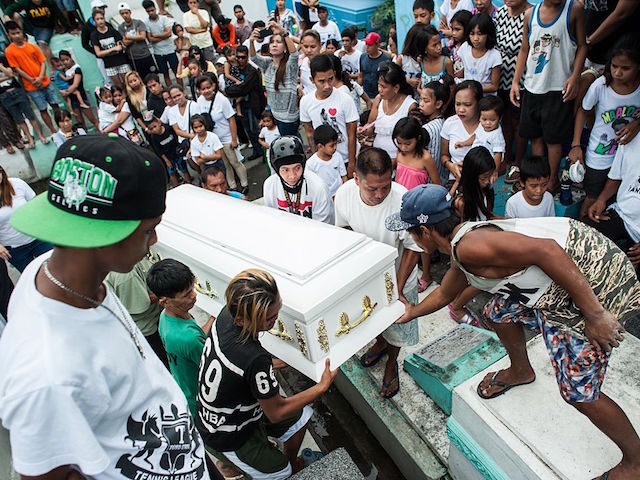The pervasive war on drugs in the Philippines has challenged the government of President Rodrigo Duterte to find ways to reintegrate drug addicts who surrender to police into society. One program proposes to return these drug offenders to the workforce by paying them to build coffins for families who cannot afford them.
Reuters highlights the program, which provides aid to families who cannot afford a proper burial for their relatives while providing reliable income for drug addicts. Some in the program also say that working so closely to death is a reminder of why they surrendered to police and hope to end their addiction to drugs.
“I knew that if I don’t change, I will be in one of those caskets,” a 44-year-old man who works in the program told Reuters.
Reuters reports that the program pays $103 a month and is part of a larger program to help those who wish to end their drug addiction do so. In Olongapo, one of the pilot cities for the program, 400 drug addicts have begun to work.
That number is tiny compared to that of the total number of Philippine nationals who have admitted to drug abuse and surrendered to police: an estimated 700,000. Duterte has made the eradication of drug addiction and drug trafficking the cornerstone of his administration’s policy, and given those involved with drugs a clear choice: surrender to police or die. Duterte has repeatedly told police to shoot first, ask questions later in drug-related operations, and encouraged bounty hunting by civilians in drug cases.
CNN notes that the first phase of Duterte’s anti-drug operation appears to be yielding in recent days to a greater focus on rehabilitation, now that the government has hundreds of thousands of drug addicts to reintegrate into society. “We’re shifting very quickly from the national security mode into the public health mode especially regarding drugs,” Presidential Spokesman Ernesto Abella explained this week. “I think in about a month or two, the new rehab centers should be operational already.”
Establishing newer, larger rehabilitation centers has become such a priority for the Duterte administration that the president has incorporated it into his foreign policy. After decades of tense relations with China, Duterte has been willing to set aside key territorial disputes to convince China to fund his anti-drug operation. It appears to have begun to pay off: Manila announced this week that a new China-funded rehabilitation facility will open in November, capable of treating up to 10,000 drug addicts.
“This initiative will not only benefit these drug victims whom we want to help and reach out to, but also for the change that we envision for our country,” Health Secretary Paulyn Jean Rosell-Ubial said of the new facility.
In return, Duterte has agreed to table a pivotal dispute in the South China Sea, where Beijing has colonized significant portions of the Philippines’ Spratly and Paracel Islands and the Scarborough Shoal. Duterte has also made increasingly belligerent statements about the established relations between Manila and Washington, calling President Barack Obama a “son of a whore” and saying he was ready to “cross the Rubicon” with the United States.

COMMENTS
Please let us know if you're having issues with commenting.